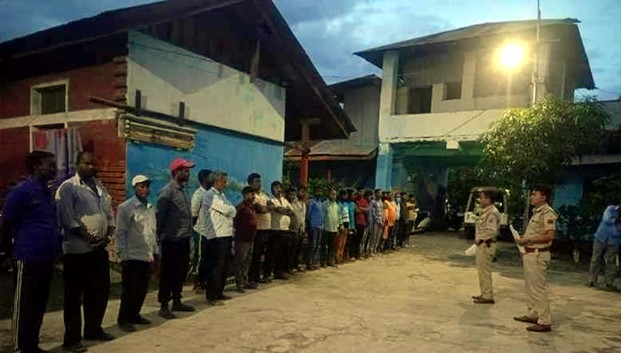Indigenous People’s Forum, Manipur (IPFM) on May 30, 2025 urges the Governor of Manipur to strictly implement the Illegal Immigration Identification and Deportation Process in Manipur by submitting a memorandum regarding the recent directive issued by the Ministry of Home Affairs (MHA), Government of India.
The IPFM extends their profound gratitude to the Union Home Minister, Amit Shah, for taking a decisive step towards addressing the long-standing issue of illegal immigration, which has posed a serious threat to the demographic balance, socio-political fabric and internal security of Manipur and the wider North Eastern region. The Ministry’s order directing all States and Union Territories to complete verification of suspected illegal immigrants from Bangladesh and Myanmar within a period of 30 days is a highly commendable initiative that resonates with the repeated appeals made by Indigenous organisations, including the Indigenous People’s Forum, Manipur, the memorandum added.
Manipur, nestled in the strategically sensitive Indo-Myanmar border region, has witnessed a considerable influx of people over the decades from neighbouring countries, particularly from Myanmar and Bangladesh. This unchecked immigration has not only caused demographic shifts in several districts of the state but has also led to social unrest, land encroachments, environmental degradation like poppy plantation and increased competition over scarce resources. The issue of illegal immigration is no longer merely a socio-political concern; it is now a matter of national security, the memorandum said.
For decades, Indigenous communities and civil society organisations in Manipur have been raising alarms about the rising presence of undocumented foreigners who often claim to be Indian citizens using fraudulent means. Unfortunately, despite repeated appeals, the matter has remained inadequately addressed, further aggravating the fears and concerns of Indigenous groups who are witnessing a rapid erosion of their identity, land and traditional way of life, the IPFM said.
The Ministry of Home Affairs has now issued a firm directive for states to verify the credentials of individuals suspected to be illegal immigrants within 30 days, failing which, such individuals may face deportation. This move represents a significant breakthrough in addressing a problem that has long been overlooked. The Indigenous People’s Forum, Manipur welcomes this step and places on record our sincere appreciation to the MHA for taking this bold and necessary measure, the IPFM added.
However, the IPFM also notes with concern the limited timeframe provided for the verification process. Given the magnitude and sensitivity of the task, especially in border areas with complex terrain, limited administrative capacity and longstanding settlement patterns, a 30-day window may be insufficient to carry out a thorough and accurate verification process.
The IPFM urges the Governor of Manipur to recommend to the Union Government an extension of the verification period beyond 30 days, ensuring that no suspected individual escapes scrutiny due to procedural limitations or lack of time. The objective must not be compromised due to administrative constraints. A systematic, transparent and well-supported process must be followed to ensure that genuine citizens are protected, while illegal immigrants are firmly and lawfully identified and deported.
It is important to highlight that this issue, if left unaddressed, could further destabilize the fragile socio-political equilibrium in the region. The presence of illegal immigrants not only threatens the rights and land ownership of Indigenous communities but also contributes to a rise in illegal activities, including drug trafficking, arms smuggling and human trafficking across porous borders.
It is pertinent to note that, in a letter dated 20 June 1973 addressed to K.C. Pant, then Minister of State for Home Affairs, Paokai Haokip, then Member of Parliament from Manipur, clearly acknowledged the settlement of over 1,500 refugee families in Manipur by 1967, the IPFM mentioned.
Official documents reveal that even before Manipur attained full statehood, thousands of refugees were rehabilitated in the state with the knowledge and support of the authorities. The memorandum stated that several key questions remain: What happened to these refugee families? How were they assimilated into society? How many generations have passed since their settlement? And what about the recent influx of illegal immigrants in regions like Churachandpur, Kangpokpi, Tengnoupal, and Kamjong? Despite its demographic impact, this issue remains largely ignored.
The IPFM further submits that the protection of Indigenous peoples of Manipur is not only a constitutional duty of the State and Union Governments but also a moral obligation to preserve the unique identity, heritage, and rights of the original inhabitants of the region. The indigenous people of Manipur have always been loyal citizens of the country, contributing to its defense, administration and cultural richness. The failure to protect their rights in the face of illegal migration would be a grave injustice.
Furthermore, the IPFM appeals the Governor of Manipur, to take up the matter considering the following points:
- Establishing dedicated verification task forces in districts bordering Myanmar. Ensure the formation of state-level and district-level task forces to coordinate the verification and deportation process.
- Engaging community-based organisations to assist in identification and verification.
- Creating secure data systems and registers to prevent future illegal settlement and land encroachment.
- Recommend the extension of the 30-day verification period to allow for a more comprehensive and foolproof process.












